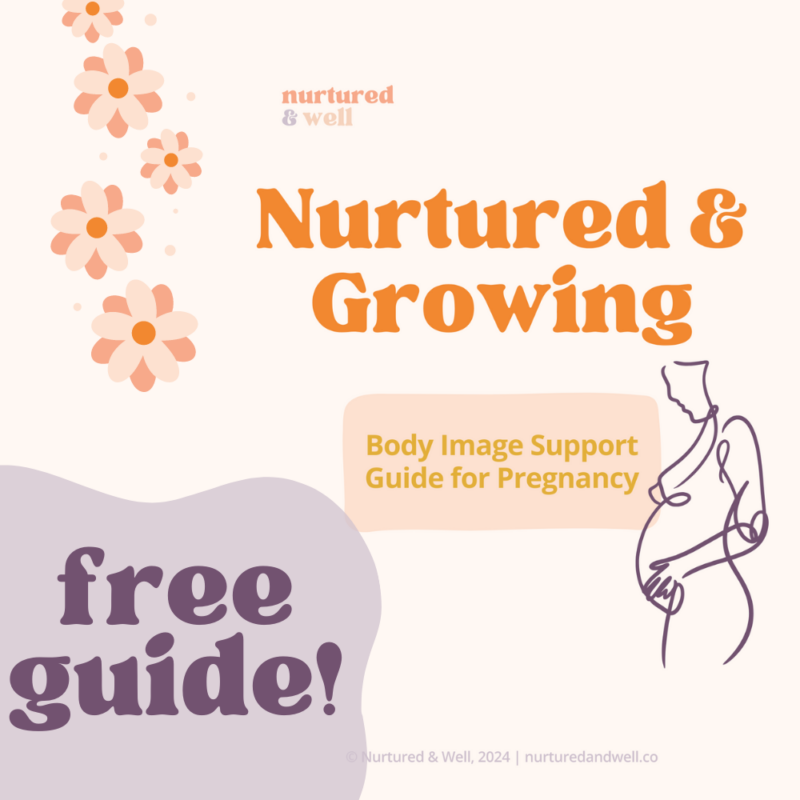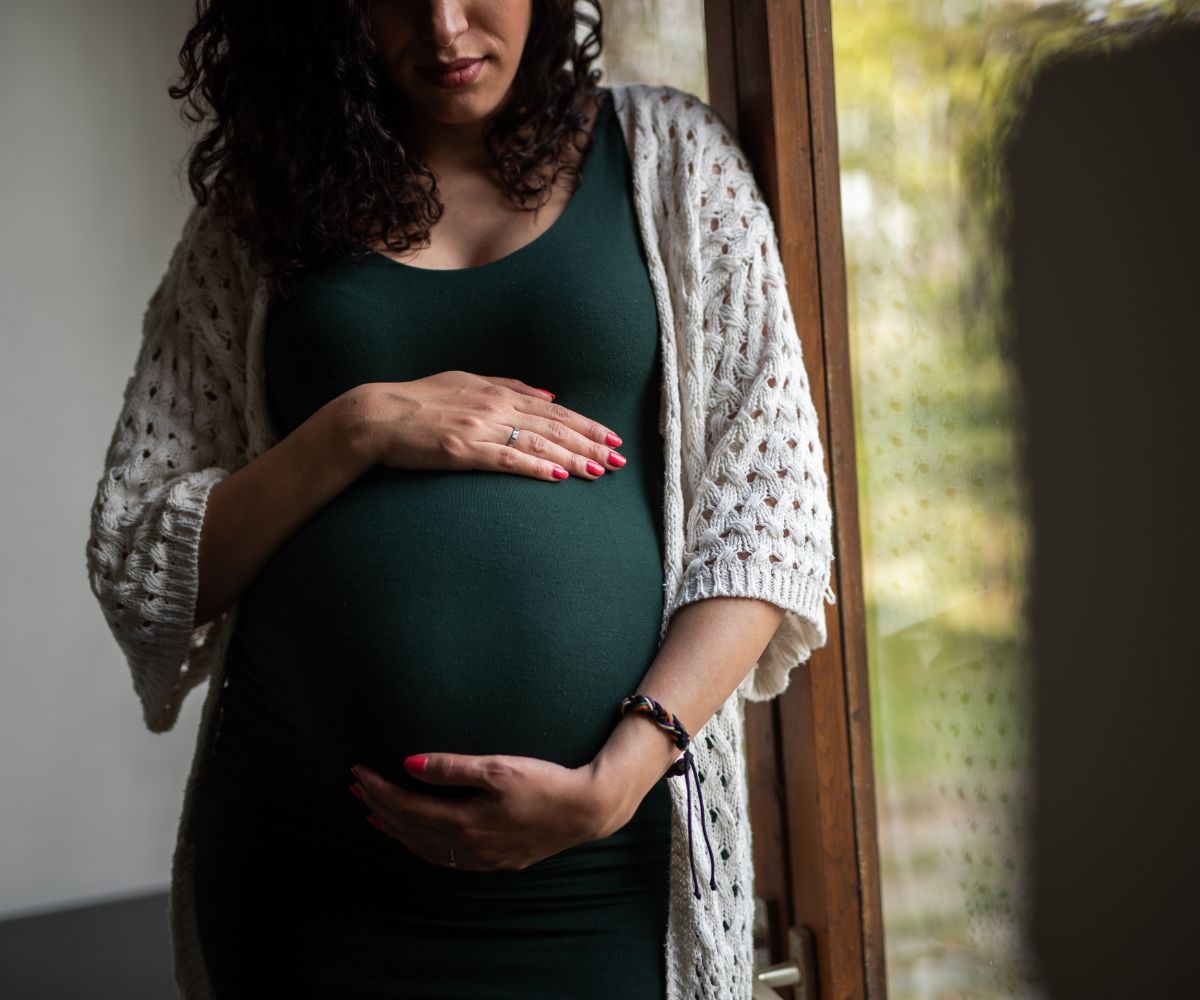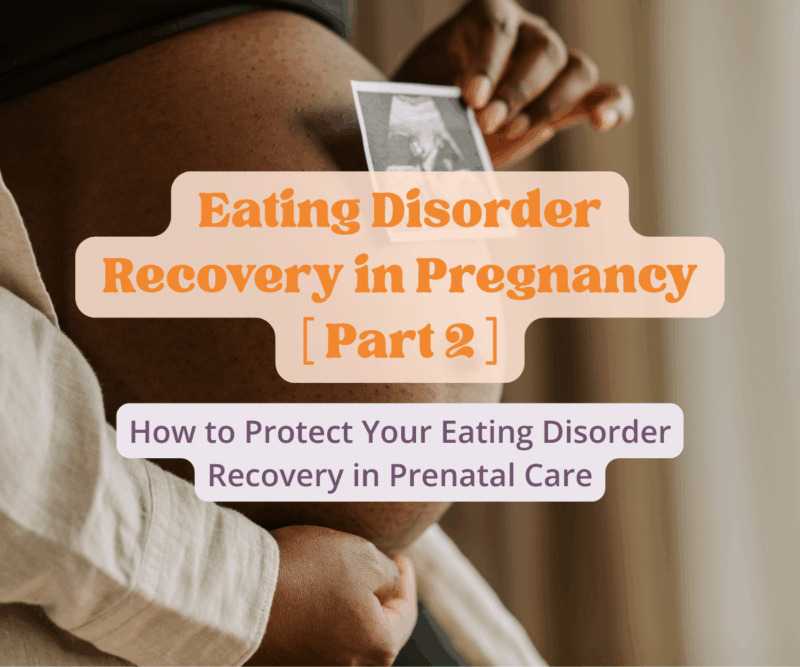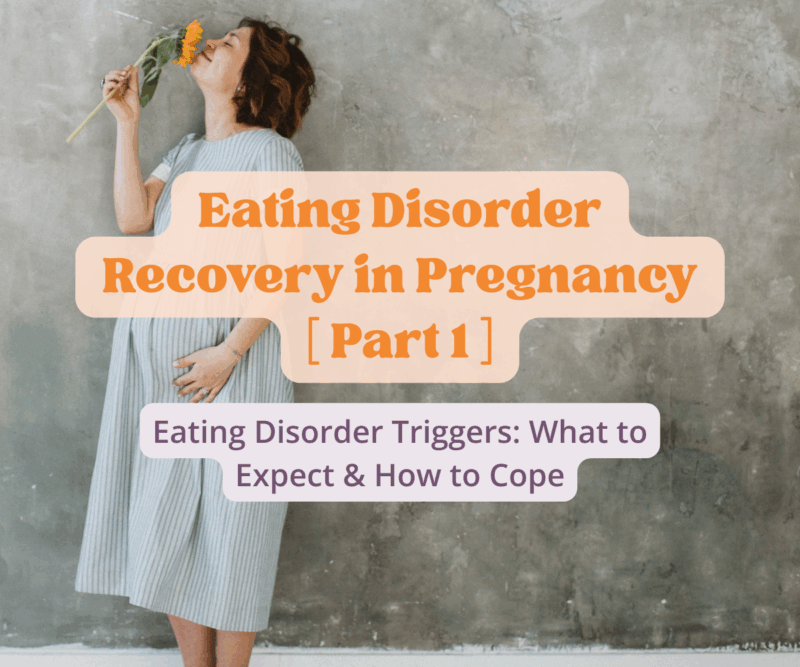When you find out you’re pregnant, one of the first things you might do is download a fun pregnancy app that tells you how big your growing baby is week by week. It’s exciting to get a peek at the miracle your body is pulling off without you needing to do anything! (Now that I know my baby was once the size of a poppy seed, I’ll never look at a poppy seed muffin the same way again.) But once some of the initial excitement about your pregnancy wears off, you might start to realize that the changes happening to your body are actually rather unsettling.
The body that was a place of stability and familiarity is changing faster than you can keep up with. Maybe you had just started to feel a little more at peace with your body before getting pregnant and suddenly you find yourself beating yourself up about your appearance – like not looking “pregnant enough”.
It’s also possible you’re feeling more positive about your body through pregnancy. I’ve definitely had some friends tell me their body image improved when they realized their body was capable of accomplishing the incredible feat of growing a new human.
There is no wrong way to feel about your body. However you are feeling is entirely valid, and how you feel will certainly change throughout your pregnancy and day to day.
A practice I encourage all of my clients to try (and something I practice myself) is body neutrality. Rather than criticizing or appraising yourself based on the way you look or appear to others, focus on the function of your body and what it allows you to do. Body neutrality teaches us that we are worth more than our appearance alone, which can help you feel more at peace with the changes going on in your body.
Here is a review of all the body systems that change during pregnancy. Try to practice gratitude for all the amazing things your body is doing, and give yourself grace for feeling uncomfortable during this time. It’s a lot of hard work!
Body Changes in Pregnancy
Endocrine System Changes
The body grows a new organ – the placenta! The placenta acts as a temporary endocrine (hormone) gland during pregnancy producing large amounts of estrogen and progesterone. These hormones increase the metabolic rate, and can cause hot flashes. Hormones produced by the placenta can also make cells in the body more resistant to insulin, leading to the diagnosis of Gestational Diabetes (GDM) in some individuals.
Hormone changes are also responsible for initiating labor and stimulating the production of breast milk.
Respiratory System Changes
During pregnancy, your lungs work harder. Your respiratory rate increases to compensate for increased oxygen needs. You may feel more out of breath.
Cardiovascular System Changes
Your blood volume increases by 45%! To accommodate this, the body grows more blood vessels, and works harder to pump blood. Your resting heart rate increases. You may notice that your feet and ankles swell due to the increase in fluid.
Gastrointestinal System Changes
Progesterone causes the lower esophageal sphincter to relax, often causing heartburn and reflux. The growing uterus displaces the stomach, intestines and other GI organs through the course of pregnancy, which can cause constipation, early fullness and make reflux worse.
Breast Tissue Cheanges
Estrogen and progesterone encourage growth in breast tissue and preparation of milk ducts for lactation – they may feel swollen and tender. The body begins producing colostrum in the third trimester.
Urinary System Changes
The kidneys work extra hard to process the increased blood volume as well as the additional waste products from the fetus. The growing uterus puts pressure on the bladder and pelvic floor muscles which often leads to weakened bladder control.
Uterine Tissue Changes
The uterus grows from the size of a lemon to the size of a watermelon throughout the course of pregnancy. The growing uterus causes the ligaments supporting it to stretch, which can sometimes be painful.
Musculoskeletal System Changes
The hormone relaxin allows the body’s ligaments to loosen allowing the body to accommodate the growing uterus and the pelvis to widen for labor. The spine realigns to support the shift in balance as the baby grows.
Skin & Hair Changes
The skin stretches rapidly as the body grows, which causes scars (stretch marks) to form. Hyperpigmentation of the abdominal midline, nipples, and belly button are common. Veins may become more visible and the palms may redden. Hormone changes reduce hair loss throughout the course of pregnancy.

Notes about Pregnancy Weight Gain
Every pregnant person experiences pregnancy in a unique way. No two pregnancies are exactly the same. Your body knows exactly what it needs to do in order to support your baby, and this can come along with some difficult changes for the pregnant person.
Recommendations for weight gain during pregnancy are based on BMI, which is flawed and does not accurately represent health. Your body may not need to change in the ways that the BMI-centered prenatal guidelines suggest, and that can be okay. While there are some instances where body weight changes can indicate pregnancy complications (ie. fluid shifts, preeclampsia, etc.), most of the time your body will gain the amount of weight that is most appropriate for you and your baby if you focus on listening to and caring for it.
Rather than worry about how much weight you “should” gain during pregnancy, focus on ways to take care of your body and trust that every change has a purpose.
On average, here are the ways the body may grow during pregnancy:

Pregnant and need more support?
If you’re struggling to accept body changes during your pregnancy, know that you are certainly not alone. I created my practice in part because I know that pregnancy can be incredibly difficult to navigate for anyone who has a difficult relationship with food and their body. Please reach out to learn more about how you can learn to nourish your growing body without shame or guilt. I am here to support you!





